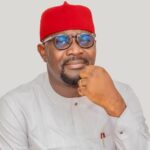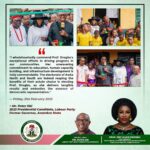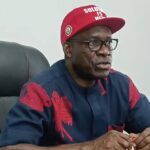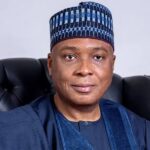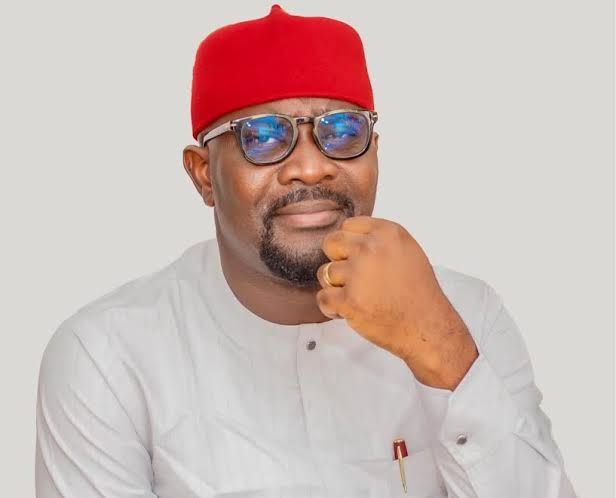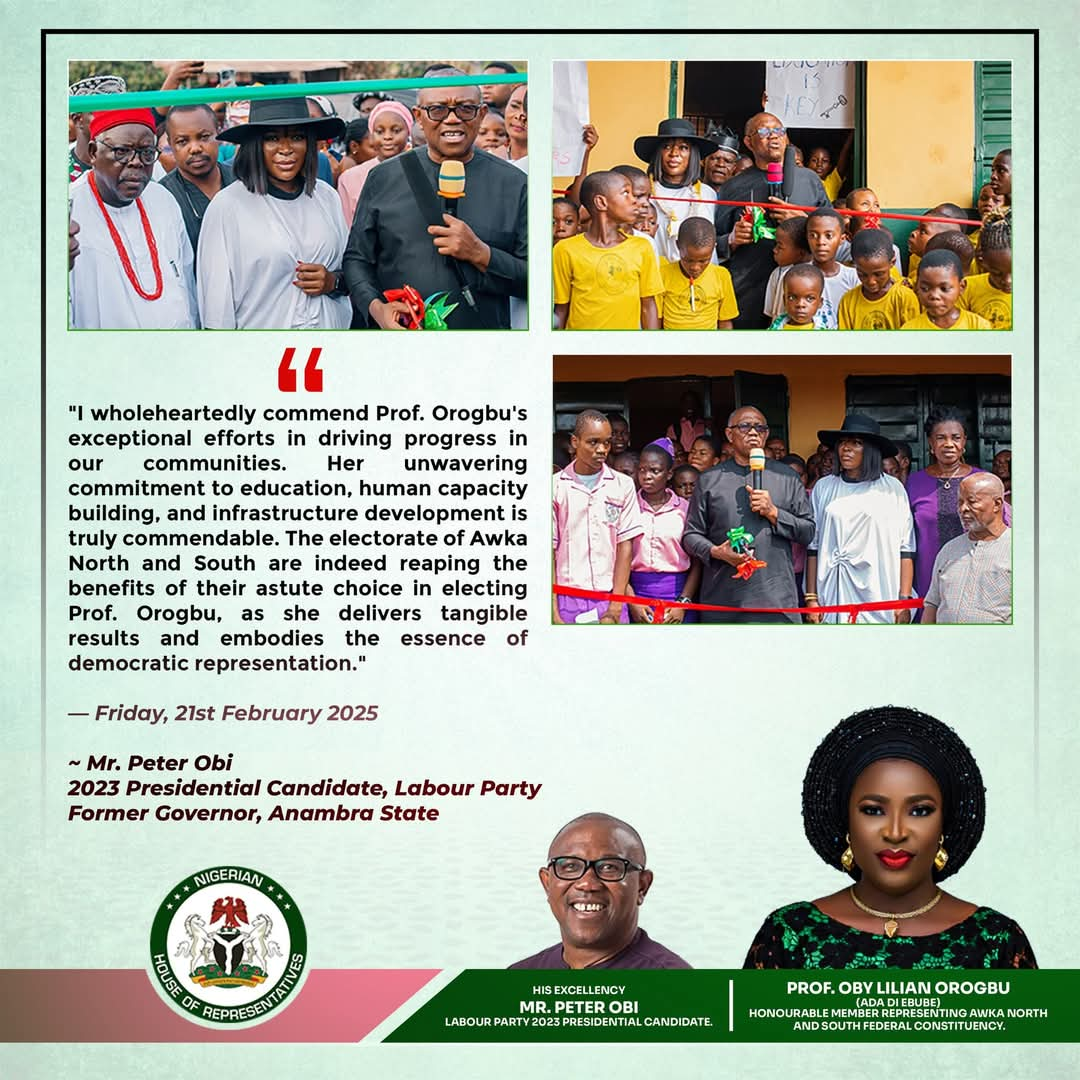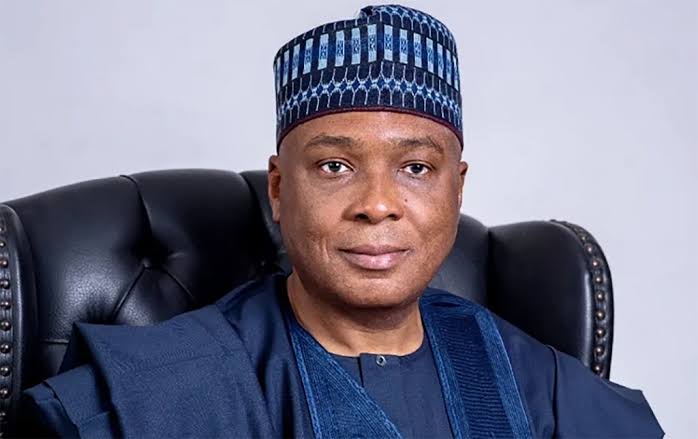By Law Mefor
Opposition politicians are sometimes able to admit the truth and provide unflattering praise. Yes, the Prof Chukwuma Soludo administration is doing remarkably well. Even the opposition in Anambra State concurs. The opposition leader of the All Progressives Congress (APC) and former governor of Anambra State, Dr. Chris Ngige, gave the glowing appraisal during the governor’s second anniversary in Awka.
His words: “We are here to celebrate a governor who has shown prudence in the management of Anambra State resources in his two years in office. We have seen his projects, and they are on the ground. He is also constructing roads that are of higher quality and have never been seen before in our state. We are happy with him because he has done well for Ndi Anambra. What is more, Soludo has not borrowed a dime despite having a nod from the state house of assembly to borrow N100bn.” A statesman like Ngige indeed knows everything is not politics.
For over one week, Governor Soludo was commissioning projects his administration has completed across Anambra State within his two years in office. Some of the roads were commissioned by the masses themselves, such as the leaders of bus drivers, Okada riders, and Keke riders in the state. It was unusual for the masses to commission multi-billion-naira projects instead of the powerful, as is most often the case.
By asking the bus drivers, Okada, and Keke riders to commission road projects, Soludo submitted himself to the masses, who voted him en-masse to be their governor and leader (Soludo won overwhelmingly in 20 out of 21 LGs in the state in the governorship election). He was rendering an account of his stewardship to the Anambra masses, who entrusted their destiny and their state into his hands for four years.
The genius of Soludo’s creative strategy is that the people now own the finished projects and are compelled to take action to safeguard them and other public infrastructure without waiting for the governor to issue an order. By allowing the masses to commission projects, Soludo has also strategically demonstrated that the people own the government. As the projects were being commissioned, the Anambra masses offered heartfelt and comforting prayers for the governor and his administration. A bus driver even offered the governor money as appreciation for his outstanding performance.
The opposition also put politics aside and acknowledged that Soludo had accomplished what previous governors had not been able to do. For instance, no other governor of Anambra State—aside from Chris Ngige and Soludo—was able to endure without taking out a loan. That is what Ngige praised Soludo for, calling it the “prudent management of scarce resources.”
Professor Soludo is not your typical politician. Despite having a major role in Nigerian politics, I’m pretty sure he doesn’t qualify as a politician in the traditional meaning of the word. Unlike the typical sleazy politicians who are more concerned with winning the next election and seizing state power, Soludo is more of a statesman who is concerned with the future and the common good. He has neither drawn a salary as governor nor purchased even an official for the state’s first lady.
As though he had Soludo in mind, James Freeman Clarke, an American statesman, and theologian, once stated, “A politician thinks of the next election; a statesman thinks of the next generation.” How to put Anambra on the real route to growth and development that will last into the future and outlive the present generation is Soludo’s main concern.
Most governors will make so much noise about their plans and achievements. Many indulge in what you may call “government through billboards and media razzmatazz.” In such states, the governors are constantly displayed on billboards on every turn. With taxpayer funds that could have been used for social intervention and welfare initiatives, radios and televisions blatantly propagandise the governors’ imagined and actual accomplishments. But Soludo prefers his achievements to speak for themselves and for him.
Pursuing the real deal, Soludo has been working quietly for the past two years, hitting milestones and radically changing Anambra’s physical infrastructure, socially reengineering the state, and changing the mentality of the people.
Over 3,000 Anambra people attended Soludo’s second anniversary Thanksgiving celebration held at the International Convention Centre in Awka: bishops, critical stakeholders, elders, captains of industry, community leaders, and leaders of thought, traders, market women, and others. A brochure was presented that listed more than 100 transformative achievements of Governor Soludo in just two years.
The people are amazed at how much work the governor has done in such a short time. In support of his buddy and brother, the governor of a sister state and another performer, Governor Alex Otti of Abia, was also present. Governor Soludo showed off his outstanding report card. In most of the state’s 21 local government areas, over 400 kilometers of new roads are being built; many of these, like the over 26-kilometer Amansea-Ebenebe-Ugbenu-Ugbene-Awba Ofemili Road, were started and completed by Governor Soludo in two years.
Additionally, thousands of teachers and healthcare professionals are employed, and the state has provided free computers, buses for schools and security services, and prenatal care. Regaining control of Anambra from the disruptive Unknown Gunmen (UGM), who had the state tightly under their control before Soludo’s arrival, is another notable accomplishment in and of itself.
Ever since his initial effort to govern Anambra State in 2010, Soludo has repeatedly mentioned turning the state into an African version of Dubai or Taiwan. Many believed it to be nothing more than sloganeering for the campaign to win over voters. But Soludo’s introduction and ardent pursuit of peerless social reengineering and key transformative development projects have demonstrated that achieving such a lofty dream is now on course.
Naturally, the term “Anambra as African Dubai-Taiwan” is a euphemism for a brand-new, smart, and livable Anambra that will realise the state’s full potential as a self-sufficient, subregional business hub and a top choice for both foreigners and Nigerians looking for comfort and investment opportunities in Africa and Nigeria.
All the needed amenities of a modern city are being laid out by Soludo, including a 5-star hotel that can host presidents, top-tier business moguls, and investors. During Soludo’s tenure, Anambra State will be able to host any type of national and international conferences and personalities from across the globe.
Soludo has indeed a great plan for a new Anambra and has gone ahead with the realisation of the plan from all fronts: social reengineering, strategic physical development, digital infrastructure, and the gradual growth and development of the younger, highly skilled generation that will shape the future and own the new Anambra.
Before Soludo arrived, Awka was arguably the least developed capital in Nigeria. Except for the three flyovers that Governor Willie Obiano constructed, Awka did not have any semblance of a state capital before Soludo’s arrival. All of that is currently drastically altering. Awka has received the attention it merits, thanks to Soludo. A lot of roads have been built to promote Awka as the state’s capital. Unbeknownst to many, Anambra lacks a government house in the traditional meaning of the term. What is considered a government house is a makeshift building; the governors of Anambra State have primarily functioned out of the governor’s lodge in the nearby town of Amawbia. Soludo is currently building a befitting government house for Anambra State.
Soludo is aware that his plan for Anambra will be incomplete without bequeathing the state steady electricity supply and has come up with a master plan to replicate the Geometric Power Project in Abia State, which he made public while showing his scorecard for two years in office. This will be the icing on the cake when Soludo pulls it through, which will rev the state to optimum levels and help to make it livable indeed.
Soludo is aware that his scorecard from the first term will be the basis for his reelection. His sterling performances should be campaigning for him—no longer what he would do if he became governor, but what he has done as governor and what remains to be done in his second term.
He is, however, entirely focused on making his first term sublime and leaving a lasting imprint on the sands of time. Let posterity and the voting public decide!
The dream of transforming Anambra into an African Dubai-Taiwan and a prosperous and habitable state is beginning to come true. While much has been accomplished, there is still plenty to be done over the next two years. In creating a new Anambra that will be the pride of Ndigbo, the country, and the black race as a whole, Soludo’s ambitious and audacious development master plan has taken off.
The least Ndi Anambra, who are the beneficiaries, can do is encourage their governor, and the politicians who are aiming for Anambra state capture to give the emerging new Anambra under Soludo a chance.
Dr. Law Mefor, an Abuja-based forensic and social psychologist, is a fellow of The Abuja School of Social and Political Thought; drlawmefor@gmail.com; Twitter: @Drlawsonmefor.

